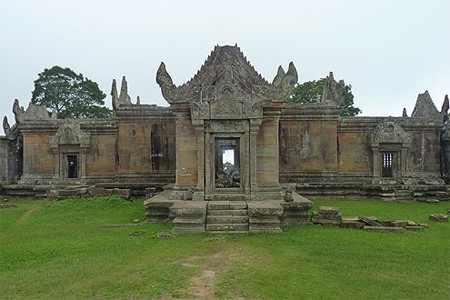THE HAGUE, July 18, 2011 (AFP) - The UN's highest court Monday ordered Thailand and Cambodia to immediately withdraw their troops from a disputed area around an ancient temple on the border between the two Asian neighbours.
The decision by the Hague-based International Court of Justice comes after an urgent request by Cambodia in April, asking the court to order Thailand to withdraw its troops and cease military activity around the 900-year-old Khmer temple of Preah Vihear, scene clashes earlier this year.

"Both parties should immediately withdraw their military personnel currently present in the provisional demilitarised zone and refrain from any military presence within that zone," said Monday's order, read by ICJ president Judge Hisashi Owada.
"Having noted that the temple area had been the scene of armed clashes between the parties and that such clashes may reoccur, the court decided... there was an urgent need for the presence of all armed forces to be temporary excluded from a provisional demilitarised zone around the area of the temple," he added.
Cambodia in late April launched a bitter legal battle before the ICJ in which it asked for an interpretation of a 1962 ruling on the Preah Vihear temple.
While judges pondered that decision, Cambodia also asked for it to order Thailand to withdraw troops and stop military activity.
Thailand in turn, asked for Cambodia's request to be scrapped from the court's general list, a request unanimously turned down Monday.
A decision on Cambodia's main request for an interpretation of the 1962 order could however still take the court several months.
Although Thailand does not dispute Cambodia's ownership of the temple, secured by the 1962 ICJ ruling, both Phnom Penh and Bangkok claim the 4.6-square-kilometre (1.8-square-mile) area surrounding the Khmer complex.
In February the United Nations appealed for a permanent ceasefire after 10 people were killed in fighting near the Khmer complex.
However fresh clashes broke out in April further west, leaving 18 dead and prompting 85,000 civilians to flee.
The court Monday urged the two countries to continue to work with the Association of Southeast Asian Nations (ASEAN) to come to an agreement to allow observers representing the 10-nation bloc to have access to the provisional demilitarised zone around the temple.
"Both parties should refrain from any action which might aggravate or extend the dispute before the court or make it more difficult to resolve," the court added.
The UN's highest court Monday also ordered Thailand not to obstruct Cambodia's free access to the Preah Vihear complex or prevent Cambodia from taking fresh supplies to its non-military personnel there.
Cambodia said although there had been clashes in the past, Thai aggression substantially increased after July 2008, when the UN's cultural body UNESCO listed the temple as a World Heritage site.
But the 11th-century complex has been at the centre of a long legal wrangle between Thailand and Cambodia -- which first took its southeastern Asian neighbour to the ICJ in 1959 over the issue.
Thailand's Foreign Minister Kasit Piromya said Monday his country would honour the ICJ ruling.
"We are satisfied in the sense that the decision of the withdrawal of the troops is applicable to both Cambodia and Thailand," he told reporters afterwards.
The Cambodian delegation, led by its Deputy Prime Minister Hor Namhong said his country was satisfied with the court's decision and the establishment of a demilitarised zone around the temple.
"What it means is there will be a permanent ceasefire. It will be tantamount to the cessation of aggression of Thailand against Cambodia," he said.
Established in 1945, the ICJ is the UN's highest judicial organ and it settles disputes between states. It is the only one of six main UN organs not located in New York.
























